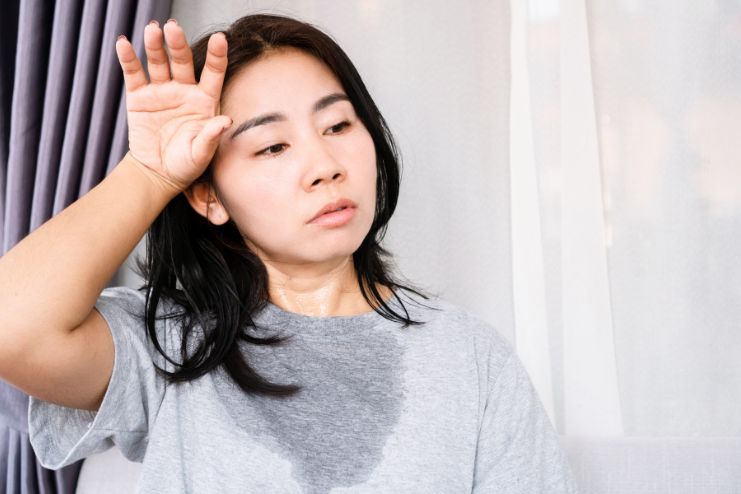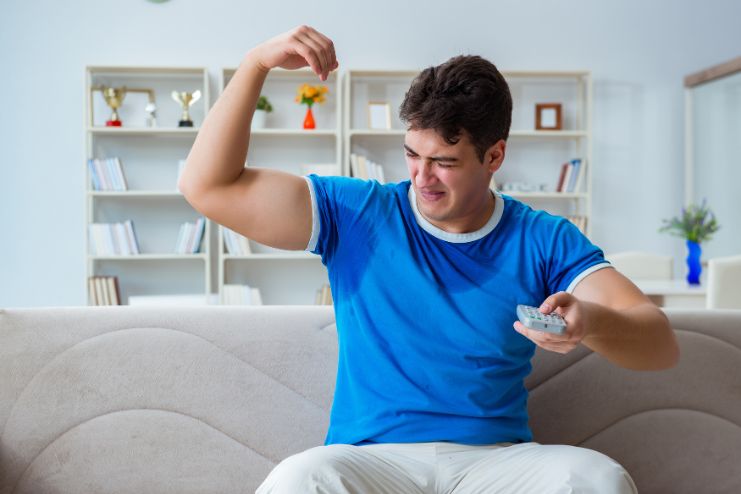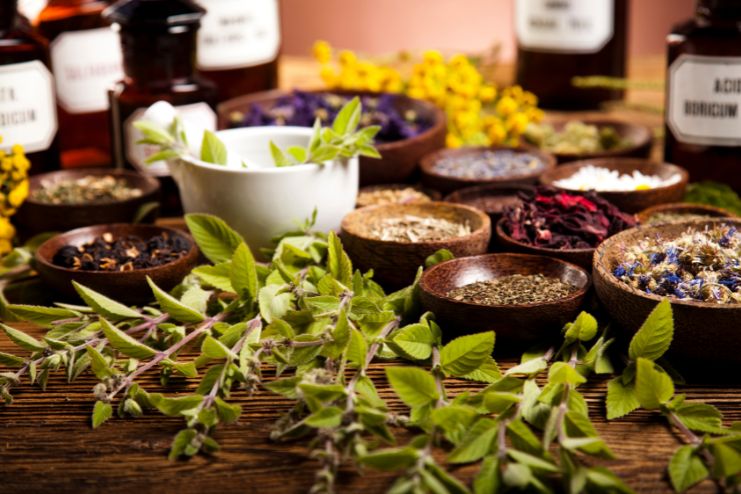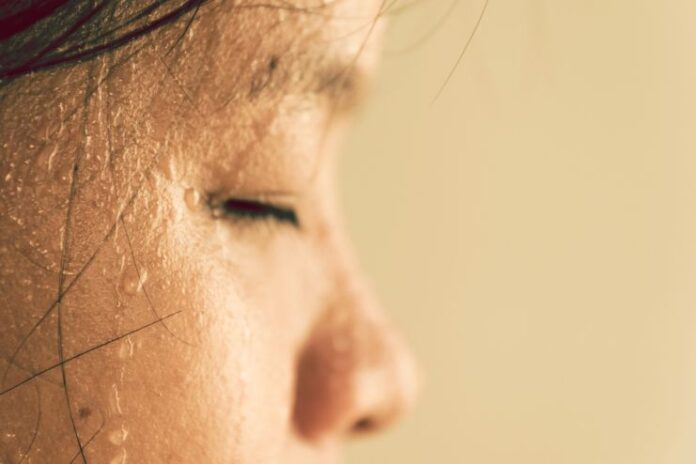Affiliate Disclaimer
Some links in this article are affiliate links. We may earn a small commission if you make a purchase through these links, at no extra cost to you. We only recommend products we find useful to our readersHave you ever been soaked in sweat for no apparent reason? You’re not by yourself. Although sweating is the body’s natural way of controlling body temperature, certain people suffer from excessive sweating or hyperhidrosis, even in cool environments or when not physically exerting themselves.
Hyperhidrosis occurs when our sweat glands become overactive and produce more sweat than is required. Excessive sweating can develop suddenly and impact the palms, feet, underarms, or even the entire body, unlike regular sweat, which reacts to heat, exercise, or stress.
This illness can cause pain, humiliation, and even anxiety and can have a major influence on social interactions, everyday living, and self-confidence. The first step in devising workable remedies is realizing the difference between normal and excessive sweating. Whether hyperhidrosis is managed medically, at home, or through lifestyle modifications, it can enhance emotional and physical comfort.
Read More: 15 Health Benefits of Sweating You Didn’t Know Of
What Causes Excessive Sweating?
Several reasons can cause you to sweat excessively, some of which might be connected to a health issue. Here are a few reasons why people sweat excessively to offer you a basic understanding of the problem.
Fever: Most people know that sweating can be a symptom of fever. It occurs when your body is battling an infection, which raises your body temperature. Sweating is your body’s way of cooling down when your temperature rises. Chills, shivering, headaches, bodily aches, and general weakness can accompany feverish sweating. Use a thermometer to measure your temperature to determine whether you have a fever.
Hypoglycemia in Diabetes: People with diabetes who have excessive sweating may be suffering from diabetic hypoglycemia. When your blood sugar levels fall below to 70 milligrams per deciliter, you have this disorder. If this occurs, consume simple sugar-containing foods or beverages immediately to raise blood sugar levels.
Hyperthyroidism: When your thyroids produce too much thyroxine, it’s called hyperthyroidism. The hormone that controls metabolism is called thyroxine. Your heart will beat quickly, and you will lose weight quickly if your system is overloaded with thyroxine. This metabolic overload results in tremors, anxiety, increased hunger, and sweat.
Having too much Weight: Being overweight makes the body work twice as complexly to maintain appropriate function, frequently resulting in excessive perspiration. The heart pumps faster to get oxygenated blood cells, elevating body temperature and causing sweating. Obese people may also perspire excessively when they perform simple activities like sitting, standing, or walking. But being obese need not be a life sentence. Discuss with your physician how to control your lifestyle to improve your health.
Heart Attack: Sweating excessively and suddenly is a classic warning sign of an impending heart attack. Heart attacks happen when anything obstructs the heart’s blood supply, usually plaque from fat or cholesterol accumulation. When the heart pumps oxygen to the body but lacks sufficient blood, the body breaks out in cold sweats, and the person may feel pressure or tightness in the chest that radiates to the arms, neck, and jaw.
Read More: Are You Chronically Dehydrated? Hidden Signs You Need More Water
Different Types of Excessive Sweating

Hyperhidrosis is divided into two groups to help patients and professionals identify the source of excess sweating and subsequently approach treatment. It can be classified as either primary focal or secondary generalized. Realizing the differences is one of the most crucial elements in comprehending hyperhidrosis.
Primary focused hyperhidrosis is the term for excessive sweating not brought on by another illness or a drug adverse effect. The illness itself is a lot of sweating. This sort of sweating is typically instead “symmetric,” meaning that the left and right sides of the body are affected similarly, and it happens in very particular locations of the body. The most frequently reported focal points are sweaty hands, feet, underarms, and face or head.
Particularly when it comes to hyperhidrosis of the hands and feet, primary focal hyperhidrosis frequently starts in childhood or adolescence. It’s interesting to note that individuals with primary focal hyperhidrosis typically do not suffer excessive sweating when they sleep despite having episodes of excessive sweating at least once a week. Research has demonstrated that primary focal hyperhidrosis may run in families and affect multiple family members.
Secondary hyperhidrosis is a disorder in which excessive perspiration is brought on by an underlying illness, a drug, or a supplement. Adults are most likely to experience secondary hyperhidrosis, which can result from a number of illnesses and medical conditions, including heart disease, obesity, diabetes, infections, cancer, and hormone imbalances.
Secondary hyperhidrosis typically manifests on a bigger scale and in more locations. When it is not restricted to specific regions, people also refer to secondary hyperhidrosis as secondary global hyperhidrosis or generalized hyperhidrosis—remembering that a brain injury or dermatologic condition may cause secondary focal hyperhidrosis, which can be limited to specific locations.
How Excessive Sweating Affects Your Daily Life

Excessive perspiration, or hyperhidrosis, can significantly impact a person’s everyday life, particularly in social settings. Anxiety and avoiding social situations might result from a fear of unsightly sweat stains or noticeable sweating. However, people may manage their symptoms and regain confidence by being aware of the illness and implementing appropriate tactics.
Effect on Relationships: The condition’s tendency to make people retreat from social situations may affect friendships and romantic relationships. Missed chances to connect can arise from the desire to avoid possible shame.
Occupational Difficulties: Participating in meetings, presentations, and networking activities can be challenging for people with hyperhidrosis. Appearance-related concerns can hinder professional relationships and career progress.
Daily Activities: Even seemingly simple things like working out, shopping, or eating out can cause discomfort. Avoiding pleasurable activities can result from a fear of perspiring too much.
Social Anxiety: People with hyperhidrosis frequently have increased anxiety in social situations because they worry about being judged or embarrassed. Sweating can be made worse by this anxiousness, leading to a vicious cycle that is hard to break.
Read More: 5 Best In-Home Sauna Systems for Detox and Relaxation
Home Remedies to Control Excessive Sweating

Although sweating is necessary for controlling body temperature, there are methods to lessen sweating. Try these sweat-reduction techniques.
- Antiperspirants
You should look in your medicine cabinet to ensure you use antiperspirant, not just deodorant. Rather than covering up foul-smelling perspiration, antiperspirants block your sweat glands.
- Witch Hazel
Witch hazel is a naturally occurring herb with antiperspirant and astringent properties. It prevents perspiration by drying up the skin and sealing the pores. For hyperhidrosis, you can apply this herb directly to the regions where you sweat or mix it with water to produce a paste that you can leave on for an hour or before washing it off with water.
- Sage
Sage leaves contain tannic acid, which constricts sweat glands and reduces sweating. Taking sage tablets, sage pills, or sage tea can help you get the advantages of sage. In general, herbal teas can significantly improve your body’s ability to fight hyperhidrosis and its consequences.
- Hair Removal
Shaving or using lasers to remove hair can make the skin feel drier. Wherever there is hair, perspiration tends to appear with more volume and odor and to remain there longer. Shaving facilitates the application of antiperspirants and helps perspiration dry more quickly.
- White Powdered Sandalwood
Although it isn’t strictly an herb, white sandalwood powder is another all-natural treatment for hyperhidrosis. Mix one tablespoon of this powder with lemon juice and rose water for the ideal at-home treatment. After applying, leave it on your skin for about twenty-five minutes to solidify, then rinse it off. For optimal effects, repeat this procedure every day!
- Root of Valerian
People widely recognize that this root significantly lowers anxiety. Since it treats some of the secondary or additional causes of hyperhidrosis or periods of excessive sweating, it can be pretty beneficial.
Read More: Top 10 Popular Myths About Hydration Busted!
When to Seek Medical Help?

Sweating is normal, but when does excessive perspiration warrant medical attention? If there is no apparent cause for your sudden, excessive perspiration or if symptoms like dizziness, weight loss, chest pain, or night sweats accompany it, a medical condition like hyperthyroidism, diabetes, or an infection may cause it.
Doctors employ variety of diagnostic procedures to identify the source of excessive sweating. The sweat test gauges the amount of sweat produced, while the starch-iodine test identifies regions with significant sweating. Additionally, blood testing might be used to rule out infections or hormone imbalances.
When you see a doctor, be ready to talk about your everyday triggers, medical history, and symptoms. Depending on the diagnosis, treatment choices could include prescription antiperspirants, drugs, or innovative therapy.
Read More: 10 Ways To Stop Sweating In Nervous Situation – Get Better Control
Conclusion
Although excessive perspiration might be annoying, practical strategies exist to control it. You can regain control and restore confidence by changing your lifestyle, attempting home cures, or getting medical help.
Finding the best remedy for hyperhidrosis begins with understanding its causes and symptoms. If sweating interferes with your daily activities, do not be afraid to seek individualized treatment alternatives from a physician.
Remind yourself that profuse sweat need not be a hindrance. Start making minor adjustments now to see what works best for you.
Have you tried any of these treatments? Leave a comment with your experience! Others going through a similar situation might benefit from your insights. Together, let’s create a helpful community!
-
Jan 2018Written by Prajakt
-
Apr 2025Edited by Ankita
References
- https://www.yalemedicine.org/conditions/excessive-sweating
- https://www.webmd.com/skin-problems-and-treatments/hyperhidrosis-causes-11
- https://stanfordhealthcare.org/medical-conditions/skin-hair-and-nails/excessive-sweating/causes.html
- https://my.clevelandclinic.org/health/diseases/17113-hyperhidrosis
- https://www.mayoclinic.org/symptoms/excessive-sweating/basics/causes/sym-20050780
- https://thedermgrouppartners.com/7-causes-of-excessive-sweating/
- https://www.sweathelp.org/home/types-of-hyperhidrosis.html
- https://pmc.ncbi.nlm.nih.gov/articles/PMC9838291/
- https://marcoscarci.co.uk/hyperhidrosis-and-its-impact-on-daily-life/
- https://www.hyperhidrosiscumc.com/natural-remedies-for-hyperhidrosis/
- https://www.sweathelp.org/sweat-help-home/press-releases/472-5-surprising-ways-to-stop-sweating.html
- https://health.clevelandclinic.org/how-to-stop-sweating
In this Article


















